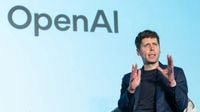OpenAI, the San Francisco-based artificial intelligence company behind ChatGPT, has soared to a staggering $500 billion valuation, making it the world’s most valuable private startup and surpassing tech giants like Elon Musk’s SpaceX and TikTok’s parent company, ByteDance. The news, first reported by Bloomberg and confirmed by Reuters and The Associated Press, follows a major secondary stock sale in which current and former OpenAI employees sold approximately $6.6 billion in shares to a group of high-profile investors. The consortium includes Thrive Capital, Dragoneer Investment Group, T. Rowe Price, Japanese tech titan SoftBank, and Abu Dhabi’s MGX.
This deal, completed in early October 2025, marks a sharp leap from OpenAI’s previous $300 billion valuation, which was set earlier this year during a $40 billion capital raise led by SoftBank. According to Reuters, the arrangement allowed for up to $10 billion in shares to be sold, signaling that some shareholders opted to hold onto their stakes—betting on the company’s future amid the ongoing AI boom. As Fox Business notes, this valuation pushes OpenAI past SpaceX, which had a $400 billion valuation in a recent insider share sale. It’s a symbolic milestone in the ongoing rivalry between OpenAI CEO Sam Altman and SpaceX founder Elon Musk, who co-founded OpenAI in 2015 but left in 2018 amid disagreements about the company’s direction.
The extraordinary valuation reflects sky-high expectations for artificial intelligence’s potential to transform industries, drive economic growth, and spark scientific breakthroughs. OpenAI’s growth has been nothing short of meteoric. The company, which began as a nonprofit research lab dedicated to ensuring AI would benefit humanity, has since adopted a "capped profit" structure. This allows it to raise billions from investors while retaining nonprofit oversight—a structure that has drawn both admiration and criticism within Silicon Valley and beyond.
OpenAI’s journey from its nonprofit roots to its current status as a tech juggernaut hasn’t been without controversy. Elon Musk, who helped launch OpenAI with the intention of keeping AI safe and accessible, has publicly criticized the company’s pivot towards profit. He’s accused OpenAI of abandoning its founding mission and has even filed lawsuits against the company and Altman, alleging violations of its original charter. Musk, now building his own rival AI startup called xAI, has integrated his chatbot Grok into X (formerly Twitter) and continues to challenge OpenAI’s dominance in the field. According to Inc., the feud between Altman and Musk is as much personal as it is professional, with the latest valuation serving as a symbolic victory for Altman.
Despite its sky-high valuation, OpenAI has yet to turn a profit. Running massive AI models and building the infrastructure to support them is an expensive endeavor. Fox Business reports that OpenAI generated about $4.3 billion in revenue in the first half of 2025, up 16 percent from all of 2024, but the company is projected to spend another $80 billion by 2029. The Associated Press notes that the company’s CEO, Sam Altman, recently addressed concerns about a potential AI bubble during a tour of a massive data center complex in Abilene, Texas. "Between the ten years we’ve already been operating and the many decades ahead of us, there will be booms and busts," Altman said. "People will overinvest and lose money, and underinvest and lose a lot of revenue. We’ll make some dumb capital allocations and there will be short-term ups and downs but over the arc that we have to plan over, we are confident that this technology will drive a new wave of unprecedented economic growth," he added, emphasizing the broader promise of AI for scientific and societal advancement.
OpenAI’s rapid expansion is not just about valuation and investor enthusiasm. The company has been busy launching new products and forging major partnerships. This week alone, OpenAI unveiled two business ventures: a partnership with Etsy and Shopify to enable online shopping through ChatGPT and a social media app called Sora, designed for generating and sharing AI-powered videos. These moves underscore OpenAI’s ambition to weave its technology into the fabric of everyday digital life and commerce.
On the strategic front, OpenAI has made significant deals with Oracle and SoftBank, partnering on a data center venture known as Stargate. The company has also secured a cloud deal with Google and is working closely with chipmaker Nvidia, whose specialized AI chips are crucial for powering the data centers that underpin OpenAI’s models. As Fox Business highlights, OpenAI’s relationship with Microsoft has also evolved. Microsoft, which invested $1 billion in OpenAI in 2019 and another $10 billion in early 2023, was previously the company’s sole compute provider. However, those terms were adjusted earlier this year, allowing OpenAI to pursue its Stargate project and diversify its infrastructure partnerships.
In September 2025, OpenAI and Microsoft announced a non-binding agreement to restructure OpenAI into a for-profit company—a move that would pave the way for a potential initial public offering (IPO) in the future. The transition, however, is subject to regulatory approval in California and Delaware, where OpenAI’s nonprofit arm is incorporated. The Associated Press reports that the change in corporate structure has drawn scrutiny from regulators, as well as pushback from Musk and others concerned about the company’s charitable mission. OpenAI hopes to complete the conversion by the end of 2025.
OpenAI’s philanthropic efforts have not been sidelined. The company recently opened applications for nonprofits to apply for $50 million in funding, with a deadline of October 8, 2025. The grants are intended to support projects that increase public understanding of AI, design AI for community-driven uses, and expand economic opportunity. This initiative, launched in response to recommendations from an advisory board, is part of OpenAI’s ongoing effort to balance profit-seeking with its original mission of public benefit.
The broader context for OpenAI’s rise is a global race for AI leadership, particularly between the United States and China. As OpenAI CFO Sarah Friar told Fox Business, AI is poised to transform jobs, businesses, and the economic future of America. The company’s ability to attract elite talent, outpace competitors, and secure massive investments has positioned it at the center of this technological revolution.
Still, questions remain about whether OpenAI and its rivals can deliver on the lofty promises that have driven their valuations into the stratosphere. The risk of an AI bubble looms, especially if generative AI products fail to meet the expectations of investors who have poured billions into research and development. But for now, OpenAI’s $500 billion valuation is a testament to both the transformative potential of artificial intelligence and the high-stakes drama playing out among the visionaries shaping its future.
As the tech world looks on, the rivalry between Sam Altman and Elon Musk continues to shape the narrative around AI’s next chapter. OpenAI’s ascent is about more than just numbers—it’s a reflection of the ambition, controversy, and human drama that drive innovation at the highest levels.






